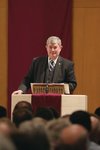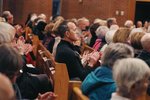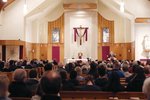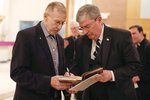



EAST GREENWICH — On Wednesday, March 23, the Catholic author, columnist, and social critic George Weigel delivered a speech at Our Lady of Mercy Parish. Weigel’s presentation, titled “The Catholic Moment: The Church in the United States and the Redemption of American Democracy,” was held as a part of the 150th Anniversary celebrations for the Diocese of Providence.
The event was co-sponsored by the diocese and the Portsmouth Institute for Faith and Culture (an organization connected with Portsmouth Abbey that holds events to train Catholics to critically engage with the culture).
Click here to view more photos!
Weigel is considered one of the definitive biographers of Pope St. John Paul II, and is best known for his two biographies on the late Pope: “Witness to Hope: A Biography of Pope John Paul II,” and “The End and the Beginning: Pope John Paul II—The Victory of Freedom, The Last Years, the Legacy.”
He has written numerous other books analyzing the intersection of religion, culture and politics. He formerly served as the president of the Ethics and Public Policy Center in Washington, D.C., and currently serves as a Distinguished Fellow, as well as the William E. Simon Chair of Catholic Studies, for the same organization. He also serves as the senior Vatican analyst for NBC News.
The lecture focused on an attempt to contextualize the current crisis in the Church within the larger framework of Church history, analyzing how events from the past laid the basis for the current state of the Church, and how an understanding of these events can help the Church better carry out its mission in the future.
The lecture, which began at 7 p.m., was introduced by Father Bernard Healey, pastor of Our Lady of Mercy.
“I think it is rather fitting, as we prepare to listen to the world-renowned author of the seminal biography ‘Witness to Hope’ of St. John Paul the Great, that I’ve been given the great honor to welcome here to Our Lady of Mercy tonight the last bishop named under the reign of St. John Paul the Great,” Father Healey said, introducing Bishop Thomas J. Tobin.
“Indeed, in the name of our parish, we are grateful to our bishop, but also grateful to that saint, St. John Paul the Great…for sending us Bishop Tobin to Providence.”
Bishop Tobin, who was in attendance with Auxiliary Bishop Evans, began with a short prayer, followed by a brief address.
“As you know, we’ve chosen the theme for our anniversary celebration from Psalm 126, which says, ‘The LORD has done great things for us, we are filled with joy,’” the bishop said.
“For 150 years, the LORD has indeed done good things for us,” Bishop Tobin continued, “and we rejoice and thank God for all the graces and blessings of the past, and all those who have come before us, but also we are filled with joy and with hope and with trust as we anticipate and welcome and embrace all the challenges and promises of the future to come.”
Chris Fisher, executive director of the Portsmouth Institute, followed Bishop Tobin and described Weigel as a “Catholic theologian and one of America’s leading public intellectuals.”
Weigel, speaking to a packed church with hundreds in attendance, began his lecture by stating that we should “look back in order to look forward…in order to locate this particular moment in Catholic history, not without its turbulence, try to identify the source of that turbulence, to ask what’s going on amidst that turbulence, and to then think together about what that might mean for the Church’s service to our country.”
He continued by asserting that one profound analogy for this theme was the story mentioned in chapters 27 and 28 of Acts of the Apostles, which speak of St. Paul, sailing from Rome, getting shipwrecked off the coast of Malta, an event that led to opportunities for greater evangelization.
Over the course of his lecture, Weigel spoke of the five great epochs — what he called “transitional periods” — in Church history.
The first lasted from the time of the schism between Christianity and Judaism in the late A.D. 1st century until the conversion of Constantine and the end of the persecution of Christianity in the early A.D. 4th century.
The defining feature of this initial epoch was a strong emphasis on evangelization and the impact of the Roman persecution. This period led to the second great transitional period, lasting from the time of Constantine through the early part of the Middle Ages.
This period, which is often seen by modern historians and theologians as being the height of the Patristic era, was marked primarily by the attempt on the part of the Church to define its own unique sense of self-identity now that it was an acceptable part of Ancient Roman society. The driving force of this period was a dialogue between Christianity and Classical thought, in which the Church attempted to, in the words of Mr. Weigel, “translate that basic kerygmatic statement into Creed.”
The third transitional period was the Medieval era, which was the result of the intellectual efforts of the Patristic period. The dominant feature of this epoch was the fact that it embodied, in Weigel’s words, “the closest synthesis of culture, society and Church ever achieved.”
This feature is best exemplified in the art, architecture, philosophy and mysticism of this time. This transitional period was brought to an end by the fourth, which began in the 16th century with the Reformation, and was continued on in the various radical (and often secularist) political movements of the 18th and 19th centuries.
The Church’s response to these events was encapsulated in the Counter-Reformation and the various reactionary movements of the early modern period. The Church during this period was defined by the clarifying and reaffirming of its traditional doctrines and a renewed missionary zeal. This was the stage of Church history coextensive with the colonization of the New World. Nonetheless, Weigel also noted that another prominent element of this era was “the emphasis on the immutability of the Church.”
The mindset of this transitional period gave way to the fifth transitional period, which extends to contemporary times. The phase in Church history the faithful are currently living through is defined by the act of “thinking through the problems of the Church in a rapidly changing world,” and is motivated by the question of “how does the Catholic Church relate to this rapidly changing world marked by industrialization, urbanization, mass education, new political forms, especially democracy.”
Weigel traces the current epoch in Church history to Pope Leo XIII (r. 1878-1903), who wrote several encyclicals directly dealing with the social, political and economic issues of his time, in addition to which he also promoted a reinvigoration of Catholic philosophy through a renewal of Thomistic thought and the promotion of exegetical Biblical study. All of this led to a “distinctive Catholic way” of dealing with politics, economics and culture. What started with Pope Leo XIII — which Weigel labels “the Leonine Revolution” — was brought to fruition by Pope John XXIII with the Second Vatican Council.
The past six decades since the start of the Council have been driven by debates on how to properly interpret the Council. Weigel asserted in his lecture that the writings of Pope St. John Paul II and Pope Benedict XVI give us much insight into how to interpret the Council, with one prominent example being the special meeting of the World Synod of Bishops called to order in 1985 by Pope St. John Paul II, convened to discuss the implementation of the Council.
The synod provided what Weigel called “the master key to unlocking the meaning of Vatican II”, namely its definition of the Church as “a communion of disciples in mission.” The starting point of authentic Christian spirituality is an encounter with Jesus which spiritually transforms us. This encounter with Jesus leads to a deeper participation in the life of the Church, which in turn exists to bring others closer to Christ.
Weigel concluded, “There is no Catholicism that is not in mission,” going on to summarize the words of Pope St. John Paul II in his 1990 encyclical “Redemptoris missio.”
“The Church does not have a mission…the Church is a mission,” he said. “Everyone in the Church is a missionary. Every place is mission territory.” This is at the heart of what would eventually become known as the New Evangelization.
Visit www.dioceseofprovidence.org/150 to see more upcoming events to celebrate the 150th anniversary of the Diocese of Providence!